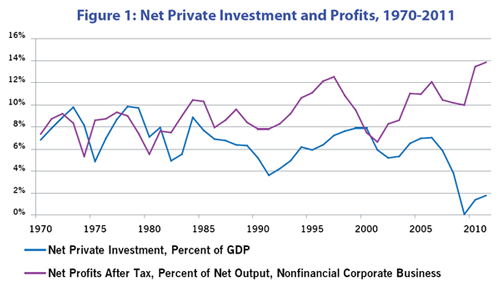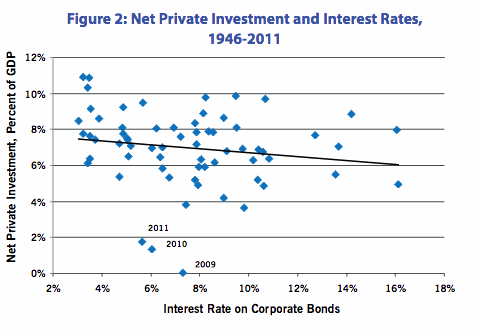Any improvement in living and working conditions in the United States is going to require far more than tinkering at the margins. The fact is that U.S. economic dynamics have undergone a major transformation.
Figure 1, taken from an article by Gerald Friedman, shows that profits and investment are no longer positively related. Since the early 2000s, profits have soared as a percent of GDP and net private investment has plummeted. Even during the 1990s, when high-technology was celebrated as the engine of never-ending growth, net investment as a share of GDP remained below 1970s and 1980s highs.

Our leading companies, the ones that shape government policy, are now able to make healthy profits without spending on plant and equipment much beyond replacement. Their profits are now largely secured by globalizing manufacturing production, financialization, intensification of work, wage suppression, and government tax-breaks and subsidies. Of course, that means that their quest for profits will continue to lead to policies likely to undermine progress in reversing negative trends in majority living and working conditions.
A case in point is their aggressive push, supported by the Obama administration, for new free trade agreements: the Trans-Pacific Partnership Free Trade Agreement and the Trans-Atlantic Free Trade Agreement. President Obama took the lead in securing passage of the Korea-U.S. Free Trade Agreement, arguing that it would improve our trade balance with Korea and by extension U.S. jobs. Well, the returns are in, and in line with the record of past agreements, the outcome is the exact opposite.
The Eyes on Trade blog offers the following summary:
April [2013] was another record-breaking month for U.S. trade with Korea under the U.S.-Korea Free Trade Agreement (FTA). The monthly U.S. trade deficit with Korea soared to its highest point in history, topping $2.5 billion for the month of April alone.
According to a ratio used by the Obama administration, the unprecedented deficit surge implies 13,500 U.S. jobs lost to trade with Korea in just thirty days. April’s trade deficit with Korea was 30% higher than in April 2012 — the first full month of FTA implementation — and 90% higher than in April 2011, before the FTA took effect.
The deficit increase owes largely to a dramatic drop in U.S. exports to Korea since enactment of the FTA. U.S. exports to Korea in April once again fell below the levels seen in any given month in the year before the FTA took effect. The sorry track record defies the promise (FTA = more exports) that the Obama administration used to pass the FTA. Undeterred by the facts, today the administration is using the same worn-out promise to sell the Trans-Pacific Partnership.
Unwilling to pursue policies that directly threaten corporate interests, the Obama administration has relied on monetary policy, or more specifically lower interest rates, to boost investment and employment. As Figure 2 from Friedman’s article makes clear, while lower rates generally boost investment, data points for 2009, 2010, and 2011 strongly suggest that monetary policy has lost its effectiveness.

President Obama can talk all he wants about the need for more investment and better jobs, but unless he is pushed to pursue dramatically different policies, it is hard to see any real gains for working people over the next decades.
Martin Hart-Landsberg is a professor of economics at Lewis and Clark College. You can follow him at Reports from the Economic Front.
Comments 10
Gman E. Willikers — August 2, 2013
This is a huge problem, and it crosses political lines. Obama just happens to occupy the White House now. The only way to fight this trend is to strip the grossly oversized influence large corporations have in the political process. The big multinational corporations no longer even have anything remotely resembling a national identity, so treating them as individuals with full rights of citizenship with respect to political speech should be considered insane by all who believe a desire to preserve the democratic process should be considered sane.
Most of bloggers on this sight would say that we need more regulations governing businesses rather than less. The big multinationals quietly (but nonetheless strongly) support that position, because they get to write the regulations, which are then presented as consumer or worker protections but primarily serve as barriers to entry. And in so doing, they prevent new business formation, a primary driver of jobs creation.
The damage from Citizens United v. Federal Election Commission needs to be corrected on a priority basis. This is one of the few causes behind which progressives, paleocons and even libertarians can unite, if it is properly understood.
Ricky — August 3, 2013
Racist! This a phony issue from Tea Bagger Libertarian/KKKonservatives to distract to distract you from the remarkable recovery that has been taking place for the last five years. How much did the Koch Brothers pay you to post this?
Village Idiot — August 3, 2013
Quoting:Our leading companies, the ones that shape government policy, are now able to make healthy profits without spending on plant and equipment much beyond replacement. Their profits are now largely secured by globalizing manufacturing production, financialization, intensification
of work, wage suppression, and government tax-breaks and subsidies. Of
course, that means that their quest for profits will continue to lead to
policies likely to undermine progress in reversing negative trends in
majority living and working conditions.
IMO it's time to stop soft-pedaling this issue. And Presidents are irrelevant.
Like Douglas Adams pointed out a long time ago, the President's job is not to wield power, it's to distract attention AWAY from power. Good thing Adams was "joking" about this fact with over-the-top science fiction satire or they'd have killed him like tends to happen to those not sanctioned as a modern version of a court jester. Analyzing the behavior ("antics" would be more accurate) of the past few Presidents in this light makes a lot of what went on make a hell of a lot more "sense" (I use the term loosely here).
Anyhow, the top priorities of corporations as they are currently structured are growth and profit, period (with no limits on the pace or size of either). In a biological organism, unchecked or unsustainable growth is called "cancer." It's not even a metaphor; cancer is literally "unregulated growth." And if left untreated it will kill the patient, which in this case is civilization as we know it.
The economic tumors known as corporations are rapidly approaching the natural limits of our resource consumption; we're already long past this planet's natural limit in terms of the long-term sustainability of our consumption levels but most people have only just recently begun to notice.
But since no widely accepted economic models currently include a functioning, healthy ecosystem in their balance sheets many still dispute the relevance of such because "the numbers" don't seem too troubling when looked at this way or that way, but that's only because the relevant numbers aren't being included in the calculations. Or while it might be true that "figures don't lie," we often forget the last part; "but liars figure."
In other words, "economics" as it currently stands is a bunch of myopic and largely-delusional bullshit. It's little more than a smoke-and-mirrors game to justify whatever needs justification that day by those with the power to make their intentions stick, and somehow Corporatism was conflated with Capitalism in the public's perception (probably though intensive corporate public relations efforts) so to criticize corporate hegemony often results in reflexively being labeled a Socialist or a Communist or Damned Liberal or whatever the public's been conditioned by corporate-controlled media to despise.
When a company can no longer increase its profits by innovation, increasing market share, or some other traditional competitive practice it's forced to either consume itself instead (outsourcing or relocating production to lower labor and regulatory compliance costs, cutting corners anywhere it can be gotten away with, lobbying for preferential legislation, etc.) or to consume other corporations. But that just delays the inevitable just like artificial life support for terminal cancer patients; at some point the patient will die no matter how heroic the effort to save them.
The way things currently stand, corporate officers are bound by law to do this or face dismissal for failing to act in the best interests of the shareholders. I guess this means "saving the planet" is currently illegal (in practice if not by actual law).
Until this changes then we will continue to watch helplessly as the declining line of Earth's natural carrying capacity of humans approaches the rising line of our steadily-increasing consumption demands. When those lines cross we'll enter the most spectacularly-interesting time in human history. It won't be any fun at all, but it'll definitely be interesting and all indications suggest that anyone alive right now who's under 40 and lives out their current average lifespan will probably get to see that day arrive since no form of cancer can keep growing indefinitely.
At least there's no need to worry about saving up for "retirement" anymore, lol...
OBAMA’S POLICY CHOICES HELP CORPORATIONS, HURT AMERICAN WORKERS | Welcome to the Doctor's Office — August 4, 2013
[...] from SocImages [...]
How the Obama Administration Is Hurting American Workers - — August 5, 2013
[...] post originally appeared on Sociological Images, a Pacific Standard partner [...]
Links 8/6/13 | Mike the Mad Biologist — August 6, 2013
[...] huge gains. Hint: It wasn’t via corporate school reform. (taken from a very good book) Obama’s Policy Choices Help Corporations, Hurt American Workers Venture Capitalist Dreams of Movie Theaters with Wi-Fi and Lights Larry Summers’ Enron [...]